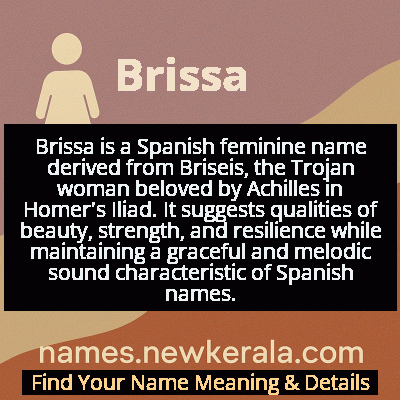Brissa Name Meaning & Details
Origin, Popularity, Numerology Analysis & Name Meaning of Brissa
Discover the origin, meaning, and cultural significance of the name BRISSA. Delve into its historical roots and explore the lasting impact it has had on communities and traditions.
Name
Brissa
Gender
Female
Origin
Spanish
Lucky Number
5
Meaning of the Name - Brissa
Brissa is a Spanish feminine name derived from Briseis, the Trojan woman beloved by Achilles in Homer's Iliad. It suggests qualities of beauty, strength, and resilience while maintaining a graceful and melodic sound characteristic of Spanish names.
Brissa - Complete Numerology Analysis
Your Numerology Number
Based on Pythagorean Numerology System
Ruling Planet
Mercury
Positive Nature
Adventurous, dynamic, curious, and social.
Negative Traits
Restless, impatient, inconsistent, prone to indulgence.
Lucky Colours
Green, white.
Lucky Days
Wednesday.
Lucky Stones
Emerald.
Harmony Numbers
1, 3, 9.
Best Suited Professions
Sales, marketing, travel, entertainment.
What People Like About You
Versatility, charisma, adventurous spirit.
Famous People Named Brissa
Brissa Ruíz
Actress
Mexican actress known for roles in telenovelas and films, recognized for her versatile performances
Brissa García
Journalist
Award-winning Spanish journalist and news anchor for major television networks
Brissa López
Fashion Designer
Influential Latin American fashion designer whose work has been featured in international fashion weeks
Name Variations & International Equivalents
Click on blue names to explore their detailed meanings. Gray names with will be available soon.
Cultural & Historical Significance
In contemporary Spanish-speaking cultures, Brissa has evolved beyond its classical origins to represent feminine strength and resilience. The name carries echoes of its mythological past while adapting to modern sensibilities, often chosen by parents who appreciate literary and historical connections. It bridges ancient Mediterranean heritage with contemporary Latin American identity, creating a name that honors classical tradition while remaining fresh and distinctive in modern naming practices.
The cultural journey of Brissa from ancient Greek epic to modern Spanish usage demonstrates how names can transcend their original contexts while retaining symbolic power. It represents a continuity of feminine archetypes—from the captive princess of mythology to the independent modern woman—while maintaining its essential character of grace under pressure and emotional depth.
Extended Personality Analysis
Individuals named Brissa are often perceived as possessing a unique blend of strength and sensitivity, reflecting their namesake's mythological background. They tend to be resilient and adaptable, capable of navigating challenging situations with grace and determination. Many Brissas exhibit strong emotional intelligence and intuition, allowing them to form deep connections with others while maintaining their independence and inner strength.
Common traits associated with Brissas include creativity, loyalty, and a natural elegance in their demeanor. They often demonstrate leadership qualities combined with empathy, making them effective in both personal and professional relationships. The name suggests someone who is both grounded and aspirational—practical in their approach to life's challenges while maintaining a sense of romantic idealism. Their combination of inner fortitude and outward grace often makes them memorable and influential figures in their social circles.
Beyond these core characteristics, Brissas are frequently described as having a quiet confidence that doesn't need constant validation. They tend to be observant and thoughtful, often serving as the emotional anchor in their relationships. While they can be reserved initially, they form deep, lasting bonds with those they trust, demonstrating the same loyalty that characterized their mythological namesake's relationship with Achilles.
Modern Usage & Popularity
Brissa has gained moderate popularity in Spanish-speaking countries over the past few decades, particularly in Mexico, Spain, and parts of Central America. While not among the most common names, it maintains a steady presence, often chosen by parents seeking a name that is both traditional and distinctive. The name experienced a resurgence in the late 20th century as classical names saw renewed interest, and it continues to be used by families who appreciate its literary connections and melodic sound. In recent years, Brissa has maintained consistent but not overwhelming usage, making it familiar enough to be recognized while remaining uncommon enough to feel unique. Its popularity tends to be higher among educated, middle-class families who value cultural and historical references in naming traditions.
Symbolic & Spiritual Meanings
Symbolically, Brissa represents the intersection of beauty and resilience, drawing from its mythological origins where beauty was both a gift and a source of conflict. The name carries connotations of feminine strength in adversity, emotional depth, and the ability to maintain dignity in challenging circumstances. It symbolizes the transformative power of love and loyalty, as well as the inner fortitude required to navigate complex emotional landscapes. The name also suggests a bridge between ancient wisdom and modern sensibility, representing continuity of human experience across centuries while adapting to contemporary values and aspirations. Metaphorically, Brissa embodies the idea that true strength often manifests as grace under pressure, and that personal value transcends external circumstances—themes that resonate from its Homeric origins to modern interpretations of feminine identity.

